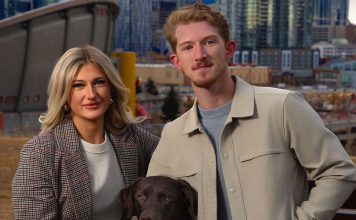Many local men and women are risking their lives overseas
By Lori Stuenkel
Gilroy – This weekend, Americans will pay tribute to the fallen souls and the survivors who selflessly serve at home and overseas. Memorial Day is more than a time for barbecues, it is a day of remembrance.
Many men and women from Gilroy who chose to serve our country now look on Memorial Day with a different perspective. They have risked their lives or lost close friends. Some remain overseas, while others have returned home. Some young servicemen and women are preparing to deploy for the first time, while others, already veterans, are preparing for a second tour.
With a sense of hometown pride, The Dispatch offers the stories of a few of Gilroy’s heroes.
A break from fighting to celebrate life
His two-week leave from Iraq was perhaps as joyous an occasion a soldier could hope for.
But Jorge Monroy, a specialist with the 82nd Infantry, also was faced with heartbreak when he briefly came home to Gilroy earlier this month. He was granted emergency leave because his mother was seriously ill and his girlfriend miscarried for a second time.
Monroy spent time with his mother, father and sisters whom he’s missed since deploying last November, and mourned the loss of his unborn child. And then, the day before his return to Iraq, Monroy married his girlfriend, Kristy.
The couple got engaged almost two years ago, but put their wedding plans on hold when Monroy got his orders. Monroy said it was a “spontaneous thing.”
“I felt I should do all that I wanted to do because out here, you can’t predict what’s going to happen,” he wrote in an e-mail earlier this week. “I’ve had two friends pass away over here and I know they had plans (for) what they wanted to do when they came home. I said to myself, ‘What if I don’t come home?’ I love her very much and I would not go away in peace if I did not make Kristy my wife.”
The couple says the wedding could not have been more beautiful.
“I had a week to plan it,” Kristy Monroy said. “It made it more special just because he was here, even though he wasn’t here that long.”
They set up 40 chairs and small canopy in the home of the soldier’s sister, Norma Galvan.
“It was small, but it was beautiful,” Kristy said.
Monroy will spend Memorial Day back at his forward operations base near Kirkuk, where he patrols the streets, gathers information from residents of nearby villages, sets up vehicle check points and clears routes of improvised explosive devices. He also visits Iraq schools and hands out candy to the students.
“If we’ve got intel, we go and get the insurgents,” he wrote. “We are very, very alert, and it’s always dangerous when you go out because you never know what the day will bring. Time passes by so quick because we are on the go, searching, scanning and trying to take every possible measure to stay safe out there.”
The 2001 Gilroy High School graduate said he lives in one of the few remaining homes of “Chemical Ali” – Saddam Hussein’s cousin, Gen. Ali Hassan al-Majeed – when he is staying at the base. He expects to be promoted to sergeant shortly.
Monroy has lost two close friends, both of whom were killed by improvised explosive devices. One of their caskets was on the plane he took home. But Monroy remains as dedicated to the Army as he was when he signed up with his parents’ permission at the age of 17.
“It’s hard to see friends die,” said Galvan, his sister. “But he’s fine and says, ‘I love what I do and I’m here to serve the United States of America.’ We’re just very, very proud of him.”
A mother leaves her newborn behind
Amber Hackett’s second child will be four months old when she returns to Iraq in October for a second tour of duty.
“It’d kind of hard, because I don’t want to leave, but you’ve got to do what you’ve got to do,” said Hackett, a specialist.
Women in the Army cannot be deployed until four months after they give birth, and the deployment of Delta Company 24 Aviation, part of the 4th Infantry, just happens to coincide with Hackett’s four months.
“But I’ve got good help,” Hackett, 25, said of Sean, her husband of three years.
The couple also has a 4-year-old son, Bradley.
“This time, it’s going to be harder on (him) because now he knows I’ll be gone,” Hackett said. “It’s also going to be hard on me to miss a year.”
She’s optimistic her time away will be easier for herself and Sean than the first deployment, because they were still new to the Army. Since Hackett’s February 2004 return after nearly a year in Iraq, the family has moved from Fort Campbell, Tenn. to Fort Hood, Texas, where she will give birth to a daughter in late June.
During her next tour, Hackett, a powertrain mechanic on Black Hawk and Chinook helicopters, said she expects to be stationed near Baghdad.
“Of course (my family doesn’t) want me to go because they see the news, too, but they’re extremely supportive of us and it helps a lot,” she said. “Just because we deploy a lot – the Army’s still really, really good and it’s been really good for my family.”
With experience under her belt, Hackett said she feels much more prepared for Iraq – and 120-degree temperatures – than before.
“I know how much sunblock to bring, how many mosquito nets I’ll need, but I don’t know if I’m 100 percent prepared,” Hackett said. “It should be easier this time, we might even have toilets. There might even be running water.”
When she was stationed near Mosul airfield with the 101st Charlie Company, Hackett was one of the first soldiers in Iraq, and helped lay the groundwork for the troops that would replace them. Now, servicemen and women stay in shelters constructed to replace tents and eat in “chow halls” rather than under the open sky.
She does note that the resistance of some Iraqi citizens has not changed since she was in the country.
“A lot of people are hesitant … they’re nice and friendly, but they don’t want to be friends.”
An Army father watches his son return for a second tour
Lt. Cesar Zapata returned from Iraq more than 10 months ago, but the Army platoon leader is just as busy here in the states.
His father, Reggie Zapata, said he saw his son for only two days when he visited Cesar at Fort Hood in April. The younger Zapata is spending up to three weeks at a time in the field training with his platoon before they re-deploy later this year.
Reggie, who retired from the Army Special Forces in late 2003 after 28 years, said he now understands how much rested on the shoulders of his own superiors.
“Now that he is going back a second time, and knowing that he will be going there for a whole year this time, his responsibilities have drastically changed,” Reggie Zapata, 49, said. “Now, he’s in charge of from 35 to 40 youngsters … 18, 19 years old and there’s a lot of pressure and responsibility with preparing these soldiers to go back to Iraq.”
Master Sgt. Reggie Zapata said it’s interesting to see things from the perspective of a commissioned officer.
Cesar Zapata, 30, was deployed with other units in the 4th Infantry Division shortly after his father returned from Afghanistan in June 2003. He was stationed near Tikrit, Iraq.
Reggie Zapata’s unit, Alpha Company 19th Special Forces, was mobilized shortly after the Sept. 11, 2001 attack and went to Afghanistan for 14 months, where unit members trained Afghan soldiers and searched for Taliban and Al Qaida terrorists. During his eight years of active duty, Reggie Zapata trained foreign military personnel in Panama, Central and South America, and parts of Asia.
“Witnessing combat myself, I know it’s not what many youngsters believe it is,” Zapata said. “Even to this day, I feel uncomfortable for (Cesar) or any individual going into combat. It’s a serious career for any young woman or man going into the military.”
Reggie Zapata said Cesar graduated from Gilroy High School in 1992 and signed up for the Army National Guard at the age of 19. Cesar graduated from Gavilan College and earned his Bachelor’s degree in psychology from San Francisco University, where he participated in the ROTC.
Cesar Zapata, who is training and unavailable for this story, has said that his training is tougher because of lessons learned in Iraq during the 4th Infantry’s first deployment.
His father is full of pride for the son who outranks him, but worries at the same time.
“It’s scary, and I never thought I’d end up having to see my son do another tour and I think it’s a normal thing now, just because we’re short on personnel,” Reggie Zapata said. “I think it caught a lot of people by surprise. I don’t think the intent was to send reserves and National Guard for one-year tours.”
A young Army ambassador hears ‘thank you’ from Iraq
He was the face of the Army in Iraq, at times a public relations liaison, at others information-gatherer. He heard both the gratitude and the problems of the Iraqi people.
Twenty-one-year-old Enrique Barrera spent 11 months getting to know the faces of Iraqi men, women and children last year, after he spent months in training to learn about their country and culture.
“We were talking to a lot of people, just everyone that lived there, letting them know why the forces were there and answering questions they had about (our) forces,” Barrera said.
As a Psychological Operations specialist, Barrera was part of a three-member team with the 12th Battalion Army Reserves that focused on a number of towns near each of the nine locations the unit saw during its tour.
The team would meet and talk with the town leaders and learn what type of support the people needed.
“When we were there, it was the time right before they were switching over the government,” Barrera said. “We would hear their problems – they just wanted someone to listen to them.”
One of the things Barrera heard most often from the people in Iraq was “thank you,” he said. Families welcomed his team into their homes for meals, rest or conversation. The appreciation expressed by some of the older men who have spent much of their lives fighting for freedom humbled Barrera.
“They were doing our job for years and years before, and would probably be around 60 or 70. They just had this look upon them – you can tell that they’ve seen a lot and been through a lot,” he said. “It was tremendous, just being able to be … 20 years old, talking to people who are two to three times my age and sharing a common bond and respect.”
After spending 24 hours a day, month after month, with Team Leader Geeno Gular of Morgan Hill and Assistant Team Leader Nicacio David of San Francisco, Barrera came to think of them as family.
“We all protected each other, we all acted like a bunch of brothers,” which Barrera said reassures his mother and three older sisters. “We became really close. To this day we still talk, we still hang out, we still go eat.”
This Memorial Day, Barrera will honor the soldiers who did not come home as his team did. His company did not lose anyone, but some of those serving around them were killed.
“You learn to work over it by fighting for them, not fighting away from them,” Barrera said. “Through all the things that I did see and my team did see, it didn’t change our attitude toward them overall. Through everything that we saw and did, nothing really changed our minds, made us stop doing what we did.”
These days, Barrera is studying nursing at De Anza Community College, but he expects to serve again next year, in Afghanistan.
“I’m looking forward to being able to do the same thing in Afghanistan making a difference in not just the Army, but the country overall, because they have a good chance of making a democratic society and they’re doing really well.”
Some Gilroy faces protecting our home
Josh Anderson
Branch: Marines
Age: 23
GHS grad: 2000
Parents: Steven and Carol Anderson
Stationed at Ground Combat Center in Twentynine Palms, expects to deploy to Iraq in February
Rene Arbizu
Branch: Army
Age: 26
Deployed: March 2003
Returned: June 2004
Parents: Maurice and Rose Marie Arbizu
Currently a police officer
with the Gilroy Police Department
Enrique Barrera
Branch: Army
Age: 21
GHS grad: 2002
Deployed: January 2004
Returned: November 2004
Parents: Maria Barrera
Attending De Anza Community College, expects to re-deploy in 2006
David Cantu
Branch: Army
Age: 23
GHS grad: 2000
Deployed: July 2002 (Afghan.)
Returned: February 2003
Deployed: August 2003 (Iraq)
Returned: November 2003
Parents: Jani Cantu
Stationed at Ft. Jackson, S.C.
Amber Hackett
Branch: Army
Age: 25
GHS grad: 1998
Deployed: March 2003
Returned: February 2004
Parents: Mike and Patty Holbrook
Stationed at Ft. Hood, Texas, will re-deploy in October
Molly Howe
Branch: Marines
Age: 18
GHS grad: 2004
Deployed: September 2004
Returned: March, currently stationed at Camp Pendleton
Parents: Jack and Anne Howe
Stationed at Camp Pendleton Expects to re-deploy in 2006
Jorge Monroy
Branch: Army
Age: 21
GHS grad: 2001
Deployed: November 2004
Parents: Aurora and Jorge Monroy
Johnny Morales
Branch: Army
Age: 23
GHS grad: 2001
Deployed: November 2004
Returned: February 2005
Parents: Miae and John Morales
Michael Navarro
Branch: Army
Age: 21
GHS grad: 2002
Deployed: February 2004
Returned: February 2005
Parents: Derek and Carolina Goodwin
Working for County Office of Education; will re-deploy
Cesar Zapata
Branch: Army
Age: 30
GHS grad: 1992
Deployed: Jan. 2004 (Afghan.)
Returned: March 2004
Parents: Reggie and Delia Zapata
Stationed at Ft. Hood, Texas; will re-deploy by November














